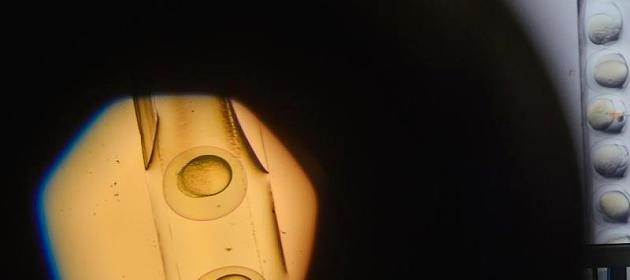20-Year-old with a blood disease treated apparently successfully for the first time with Crispr

So far, patients with Beta-thalassemia were in need of a stem cell donor. With the new Genschere Crispr/Cas could change that. But scientists warn against jumping to conclusions. Yet you don’t know how the therapy affects the long-term.
In Regensburg, a therapy with the Genschere Crispr/Cas against the hereditary blood disorder Beta-thalassemia has shown an initial success. The world’s first so-treated thalassemia patient since nine months "normal Blutwerte" on, informed the University hospital of Regensburg.
Previously, the 20-Year-old had to rely on regular blood transfusions. The first results of the medical are positive. "For patients who can be offered curative Alternative, would this form of therapy is the healing of a terrible disease bedeuten", Selim Corbacioglu, head of the Department of pediatric Hematology, Oncology and stem cell transplantation at the University hospital in Regensburg, said.
So far, the donor instructed
Patients suffering from Beta-thalassemia can only be cured by stem cell transplant if a suitable donor. "On the positive side is that it is shown that it is, in principle, with the Crispr/Cas9 method funktioniert", Holger Cario from the children’s-Hematology and Oncology at the University hospital of Ulm, who was not involved in the study said. The success, however, is highly dependent on how much hemoglobin is formed and whether this is sufficient.
The blood cells can’t transport people with Beta-thalassemia is sufficient oxygen in the body. In the therapy of the University hospital of Regensburg, patients blood will be taken from the end of stem cells in a laboratory by the Crispr/Cas9 methods. Subsequently, the patients are fed these genetically modified cells. The new blood stem cells begin to form functional blood cells. No gene defects will be corrected, but an alternative Gene for Hemoglobin synthesis, which was in the fetus is already active.
To a hasty conclusion?
As a researcher, he is pleased about these preliminary results, said he is working at the University hospital in Hamburg-Eppendorf. As President of the German society for gene therapy, he can see, however, it is very critical to publish a study of individual patient data. "You have to have a certain number of patients and a sufficiently long period of time, in order to prove that a therapy works." To simply proclaim the first success after a relatively short observation time, was not in school.
In the study to be included, according to the University of Regensburg in six study centers worldwide, a total of 45 patients with Beta-thalassemia, which are then looked after for over two years and followed for.
Read also: PUSH – wonder weapon-with CRISPR–Cas9 In the fight against cancer: the first Patient with Gene-scissors treated
In addition, physicians in the United States had used the Genschere Crispr/Cas according to the University of Regensburg recently successful in a patient for the treatment of sickle cell disease. This leads to blood vessels clogged blood. Patients suffer under pain, as well as brain and lung infarction. In the case of the U.S. patient at the beginning had been detected since the treatment four months ago, no vessel closures and more.
"The previous data hoffnungsvoll"
This result give also cause for hope, says Corbacioglu. He believe that the therapy could work in thalassemia and in sickle cell disease, – said Fehse. "It is the first patient in which Crispr/Cas9 has been used to treat thalassemia and sickle cell disease. If you are healed, we still know nicht", he stressed. "But the existing data are encouraging." If the conventional gene therapy using viruses as a Vector, or the Genschere Crispr/Cas would be more efficient and have fewer side effects, it is not possible to say. "Only the future will tell."
So far, there are more than ten clinical studies with Crispr/Cas9 in the world to various diseases. In the case of various cancer immune therapies is the Genschere have shown in individual patient successes. The result of Regensburg was encouraging, said Klaus Cichutek, President of the nationwide competent Paul-Ehrlich-Institute. "But first, a suitable number of treatment results in clinical trials may lead to an objective and statistically significant statement about the efficacy and the risks of this gene therapy."
Changes in the genetic material
From experimental data with Crispr/Cas, you know, according to Cario, in a very low percentage of non-specific changes in the genetic material can happen. This would be in the small dimensions, but it is important to take into account in terms of the long-term safety of the procedure.
According to Corbacioglu the study in Regensburg, Germany first of all, the principled feasibility of the procedure, and acute side effects. The Medical Director of Hematology at the University hospital of Heidelberg, Andreas Kulozik, sees the Crispr/Cas9 method potential to heal the affected people. His clinic also conducts research on Beta-thalassemia can be inserted using the so-called Genaddition, in the case of the genes. So far, this procedure has been carried out according to Kulozik at about 50 patients, and was 80 percent successful.
In his opinion both methods pros and cons. "Conceptually, the Crispr/Cas is perhaps more elegant, but the practical Benefit must be demonstrated in a larger number of patients." The therapy by means of Genaddition in the case of Beta-thalassemia had been admitted under the name of Zynteglo this year in the EU, with parts of the Paul-Ehrlich-Institute. Zyntelko costs, according to Kulozik is estimated that around 1.5 million Euro way.
15 E-points each day to collect! A simple method to protect your vessels
